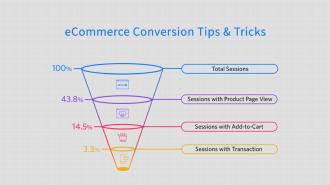Summary / TL;DR
The blog reviews the 10 best eCommerce platforms for building and scaling online stores, highlighting features, pricing, and pros and cons for each. Shopify leads with end-to-end eCommerce tools, strong mobile integration, and omnichannel POS support. Wix and Squarespace offer user-friendly design with free templates and built-in sales tools, ideal for beginners. WooCommerce and Adobe Commerce cater to users seeking advanced customisation but require technical expertise. Platforms like Square Online, Big Cartel, and Ecwid are suitable for small sellers, offering free plans with essential tools. BigCommerce and Shift4Shop support multichannel sales and marketing tools but may present limitations like complex design or geographic restrictions.
This article takes a close look at some leading eCommerce platforms for building online stores, handling multichannel sales, and executing marketing strategies. Have a glance at the graph below to see the market share of these platforms. Remember, the most popular option might not always cater precisely to your unique business needs.
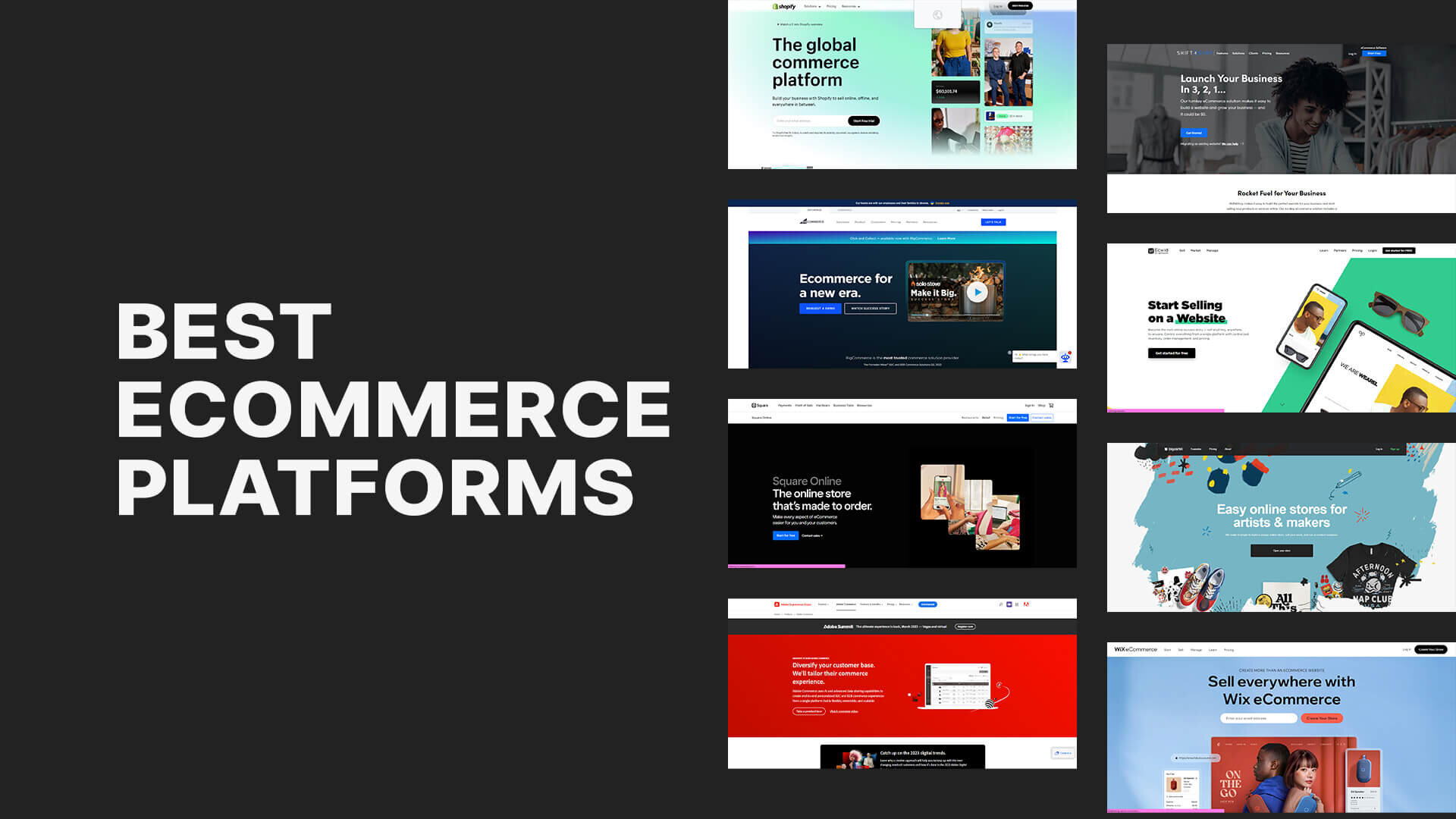
We’ve chosen ten eCommerce platforms judged on user ratings, features, pricing, and functionality. The selection ranges from industry giants like Shopify to platforms tailored for artists such as Big Cartel. Let’s dive into what these eCommerce options can deliver.
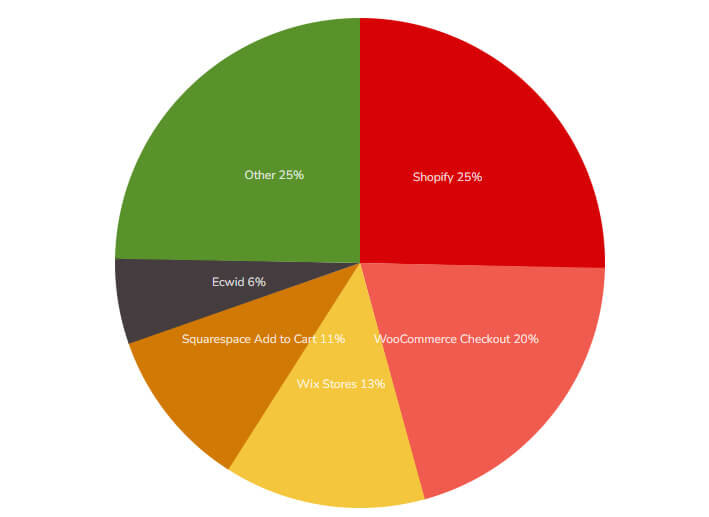
1. Shopify
G2 Rating: 4.4 Stars
Capterra Rating: 4.5 Stars
Forbes Advisor Rating: 4.5 Stars
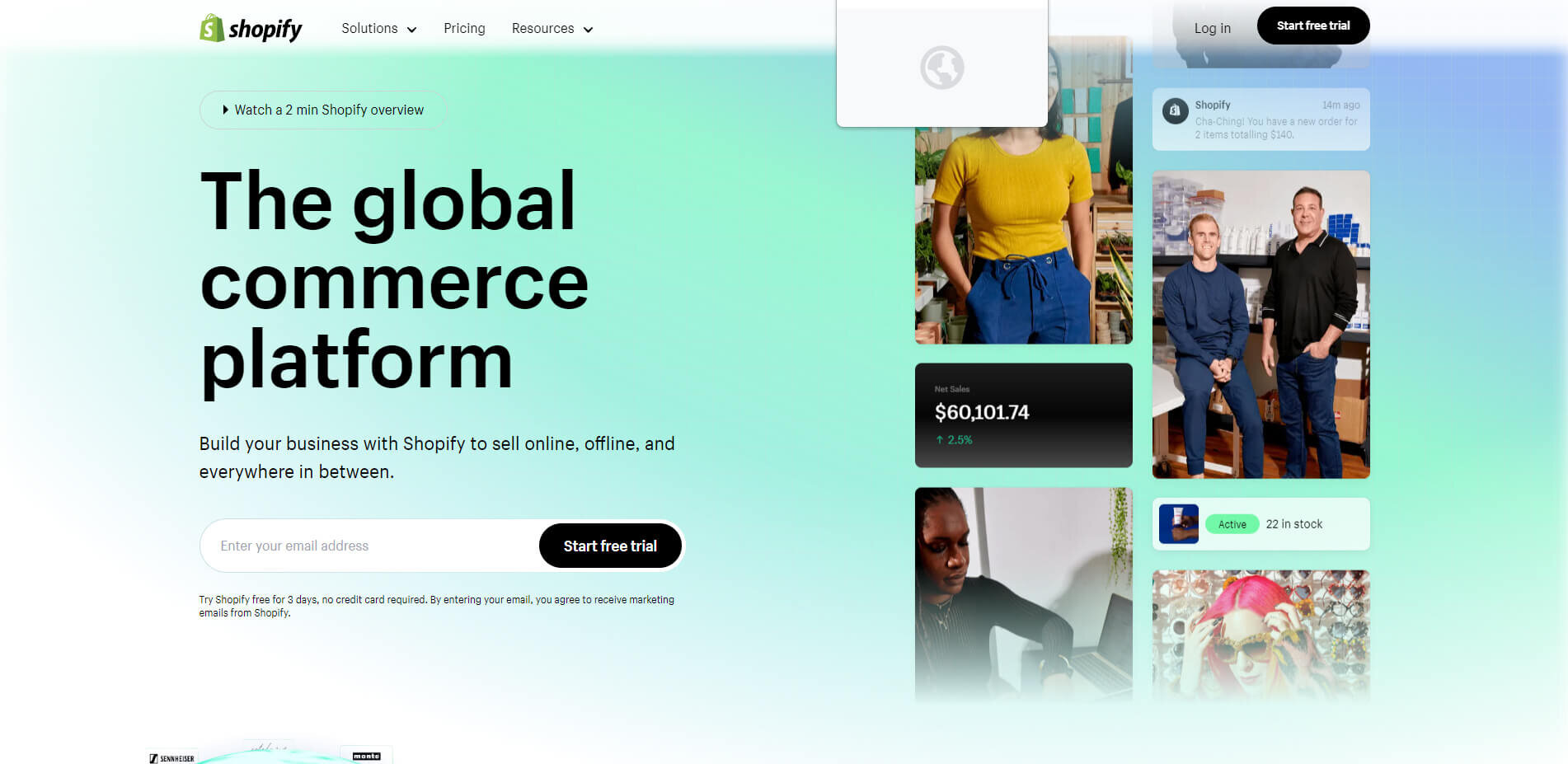
The Shopify logo is a staple of user-friendly design in top online shop platforms globally. This SaaS platform has over four million active users and powers over 6,300,000 online platforms to add products worldwide.
Shopify delivers end-to-end eCommerce functionality with all the essential tools required, including a mobile app, for small businesses and enterprises. Get started with an eCommerce business from scratch using Shopify and develop an international brand on this robust platform. It facilitates website design, online store management, digital marketing, and sales management.
The platform supports omnichannel sales, letting you use the same POS system for brick-and-mortar shops, social media, online stores, and marketplaces. Take, for instance, Amazon sellers who can link their store to Shopify, managing sales in one spot. Plus, users get preferential rates from various shipping carriers for swift international deliveries. It offers diverse fulfillment solutions, from storage to inventory management and transport.
Pros
- Dropshipping integrations
- Omnichannel POS
- Shopify payments and other payment processing integrations
- Community support
- Built-in marketing & analytics tools
- 4000 apps integrations
Cons
- It does not have a free-plan
- The premium plan enables enhanced selling through social media and messaging apps
- The business basic plan has limited features
- Limited customisation options
- Advanced customisations are difficult
2. Wix
G2 Rating: 4.2 Stars
Capterra Rating: 4.4 Stars
Forbes Advisor Rating: 4.3 Stars

Wix is a popular platform that is celebrated as one of the eCommerce website builders for its user-friendly interface in website customisation. Though not solely dedicated to eCommerce, Wix has ample features tailored to sell online efficiently. The platform has over 200 million users and supports over 652,000,000 online stores.
Wix makes it easy to create your online store. You can choose from a variety of free themes or paid online store templates. Additionally, you can use drag-and-drop features to customise your store as you like. Wix is an excellent starting point for creating your first eCommerce store. Most of the features are designed for ease of use, and you can keep building your store even if you know nothing about website development.
Furthermore, Wix has a suite of features and functionality for sales and marketing to facilitate your eCommerce stores differently. The platform allows you to track orders, sell products through multiple channels, and integrate various payment options. It also has a few marketing automation features, such as abandoned cart recovery and recurring payments.
Pros
- Intuitive website design features with free templates
- Fully hosted eCommerce platform solutions
- No limit on the number of products
- Abandoned cart recovery campaigns
- Accept recurring payments for a product subscription
- Multichannel selling
- Dropshipping Integration
Cons
- Advanced customisation is difficult
- Limited support system for advanced commerce needs
- The website is not transferable
- The free plan comes with Wix branding
- No product reviews or analytics for free plan
- Storage limit makes it difficult to scale
- Limited inventory management features
3. Squarespace
G2 Rating: 4.4 Stars
Capterra Rating: 4.6 Stars
Forbes Advisor Rating: 4.9 Stars

Squarespace, like Wix, stands out among website builders with numerous eCommerce features. This platform is best known for its visually attractive and user-friendly templates for creating online stores. Squarespace has over 3 million subscribers and supports more than 280,000 online stores.
Squarespace, highly regarded in the eCommerce realm, lets users craft visually stunning online stores with plenty of customisation options. No technical expertise is needed/strong>. Plus, the platform offers a variety of appealing features for your eCommerce website, supporting inventory management, product subscriptions, gift cards, and more.
Squarespace websites come with a custom domain and mobile optimisation. You can use the platform for various digital marketing campaigns through social media, content optimisation, SEO, search ads, affiliate marketing, email marketing, etc. Squarespace enables you to employ products abandoned cart recovery campaigns.
Pros
- Easy to create eCommerce websites
- visually appealing customisable templates with attractive features
- Complete hosting with domain registration and SSL certification
- No limits on the number of products
- No storage limits
- Social media integrations
- No transaction fees
Cons
- Limited payment gateways
- Templates may require manual editing, which can be difficult.
- Limited app integrations
- Limited multichannel sales
- Difficult to scale
- Limited shipping options
- No free plans
- Limited analytics
4. Bigcommerce
G2 Rating: 4.2 Stars
Capterra Rating: 4.4 Stars
Forbes Advisor Rating: 4.2 Stars
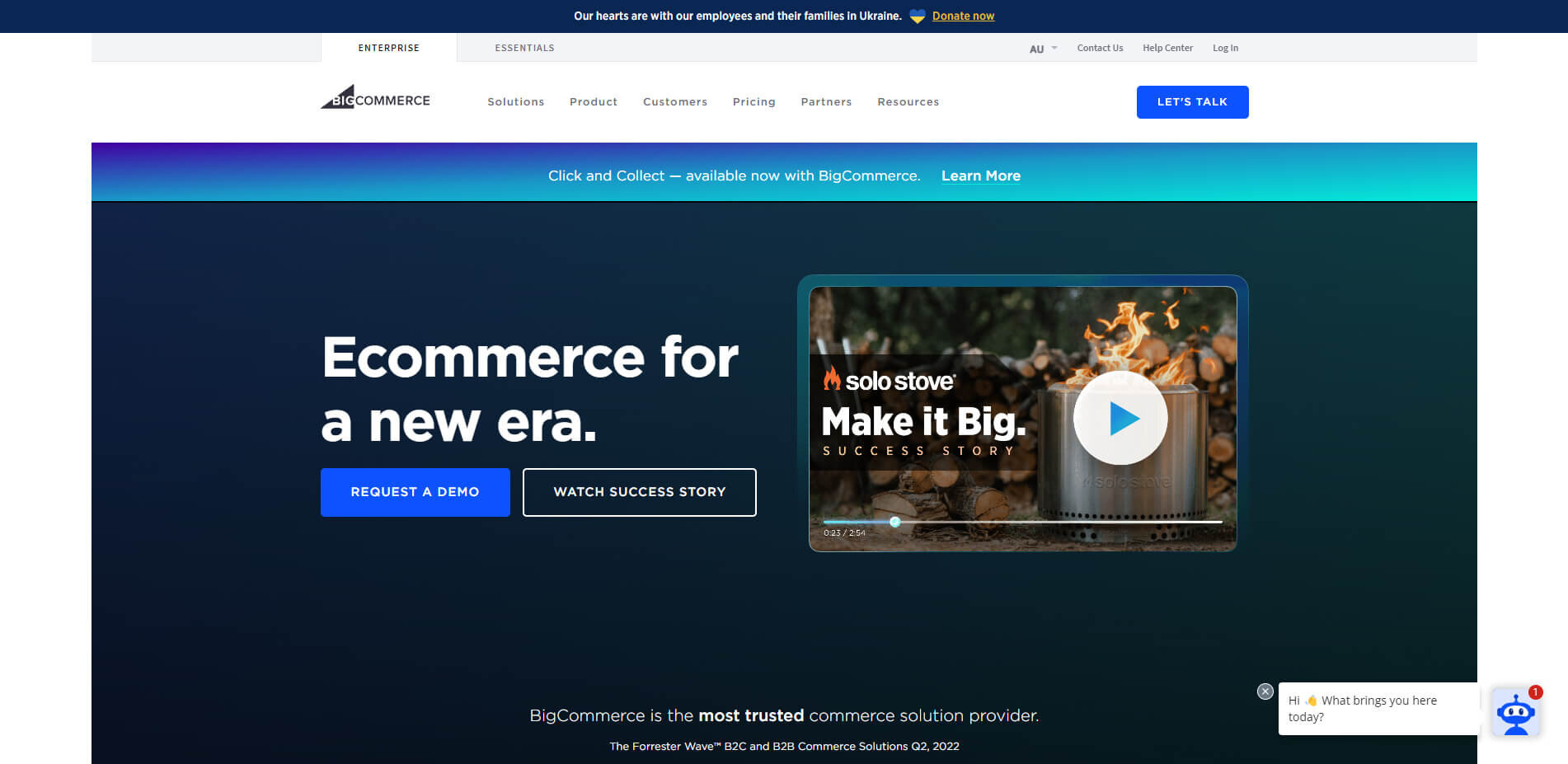
BigCommerce is an open-source SaaS platform that provides end-to-end solutions to sell online effectively. This platform allows you to create, maintain, and grow your eCommerce site. The platform offers significant flexibility when designing your online platform with many built-in customisations.
BigCommerce offers great flexibility for your business. Enjoy unlimited storage, products, bandwidth, and staff accounts. You can also integrate multiple payment gateways and handle payments in various currencies. The platform adeptly manages both online and offline sales channels at the same time.
The key features of BigCommerce are the sales and marketing features that allow users to target and convert customers aggressively. It is designed as an eCommerce solution for getting started rapidly, ensuring fast selling, and quick store setup.
You can run a variety of paid and organic campaigns. The platform also facilitates marketing automation and retargeting to a certain extent. Furthermore, you can create customer groups to design a personalised experience for your customers within various target audiences.
Pros
- In-built sales and marketing tools
- Unlimited storage, staff accounts, products, and bandwidth
- Multichannel sales management
- No transaction fees
- 24/7 customer support in all plans
- In-built content marketing and SEO features
- Easy mobile optimisation
- Payment gateway options supporting multiple currencies
Cons
- Website designing can be complicated and is difficult to edit
- No domain name registration
- Migration can be very difficult
- Limited app integrations
- even plans with annual billing, starting at $27 per month, have an upper limit on annual sales
- premium themes come with an additional cost
- Complicated user interface
5. WooCommerce
G2 Rating: 4.4 Stars
Capterra Rating: 4.5 Stars
Forbes Advisor Rating: 4.1 Stars
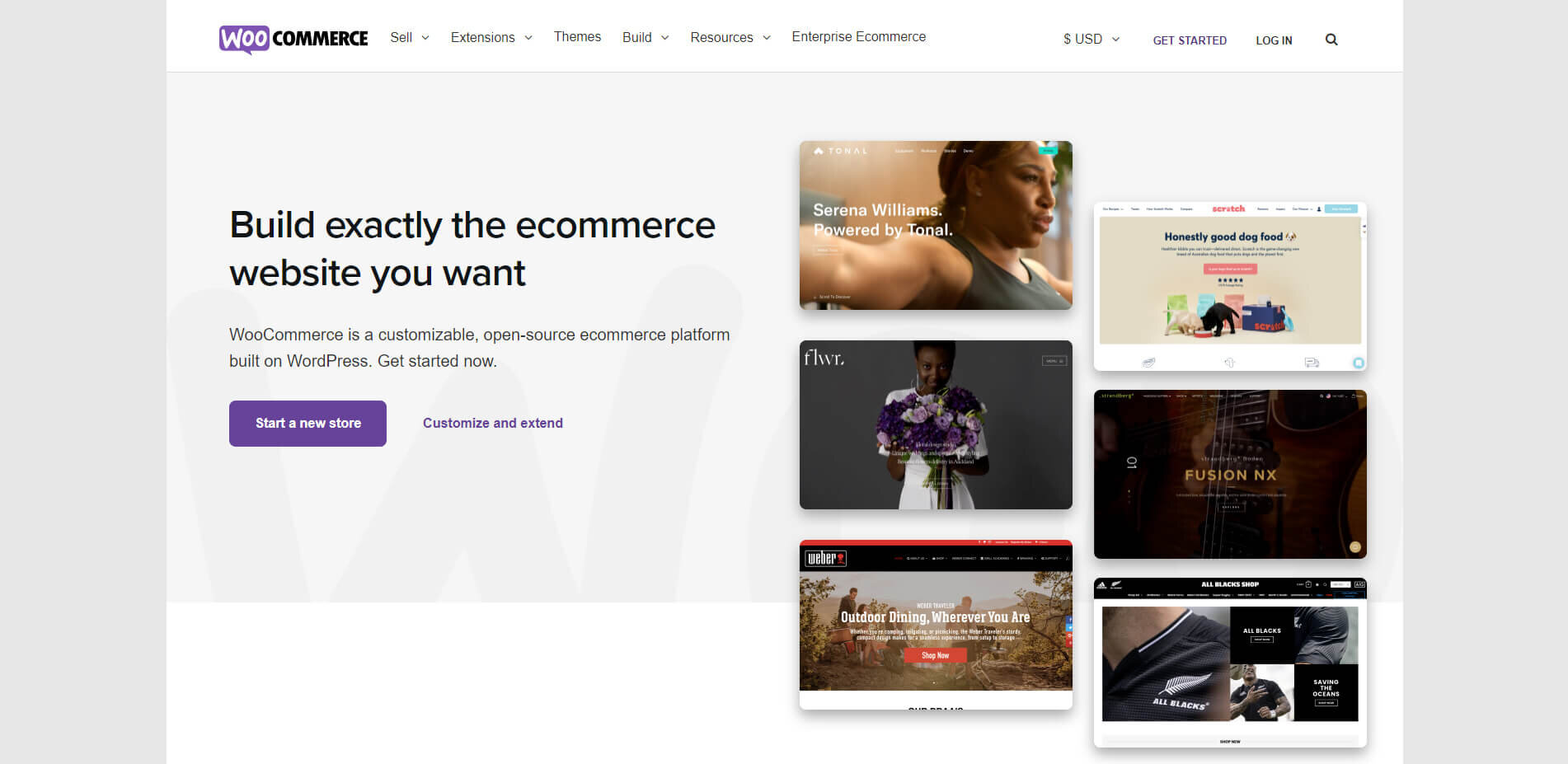
WooCommerce, a self-hosted WordPress plugin, activates eCommerce features for WordPress sites. You can use it to build a new online store or convert an existing site into an eCommerce store. This top-tier platform supports over 6 million stores globally.
WooCommerce is a highly versatile plugin that allows you to create any online store as long as you have the technical knowledge to execute it. You can also get a variety of free and paid templates to develop your eCommerce store. People can also develop their online store using easy-to-use templates or without. But you need to understand WordPress to do so.
Even with the free version, WooCommerce has ample in-built options to customise the website. Additionally, the platform supports both built-in and third-party extensions for myriad business functionalities. You can get as creative as you want with your eCommerce website.
These add-ons can help you with different aspects of your eCommerce business. You can get extensions for inventory management, designing the checkout process and customer experience, product subscriptions, estimating profits, managing payment gateways, running referral programmes, and more. However, many of these extensions are paid and may require technical support.
Pros
- You can launch an eCommerce website for free.
- There are abundant templates, templates and customisation options in the free plan.
- Hundreds of extensions for a variety of purposes.
- Several payment and shipping options
- Community support
- Complete freedom to create and customise.
Cons
- The plan does not include domain registration, web hosting, and SSL certification.
- Requires technical know-how to develop and maintain a website.
- Some necessary integrations and extensions are expensive.
- It only works with WordPress.
- Users face several issues with updates, integrations, and extensions.
6. Square Online
G2 Rating: 4.2 Stars
Capterra Rating: 4.7 Stars
Forbes Advisor Rating: 4.8 Stars
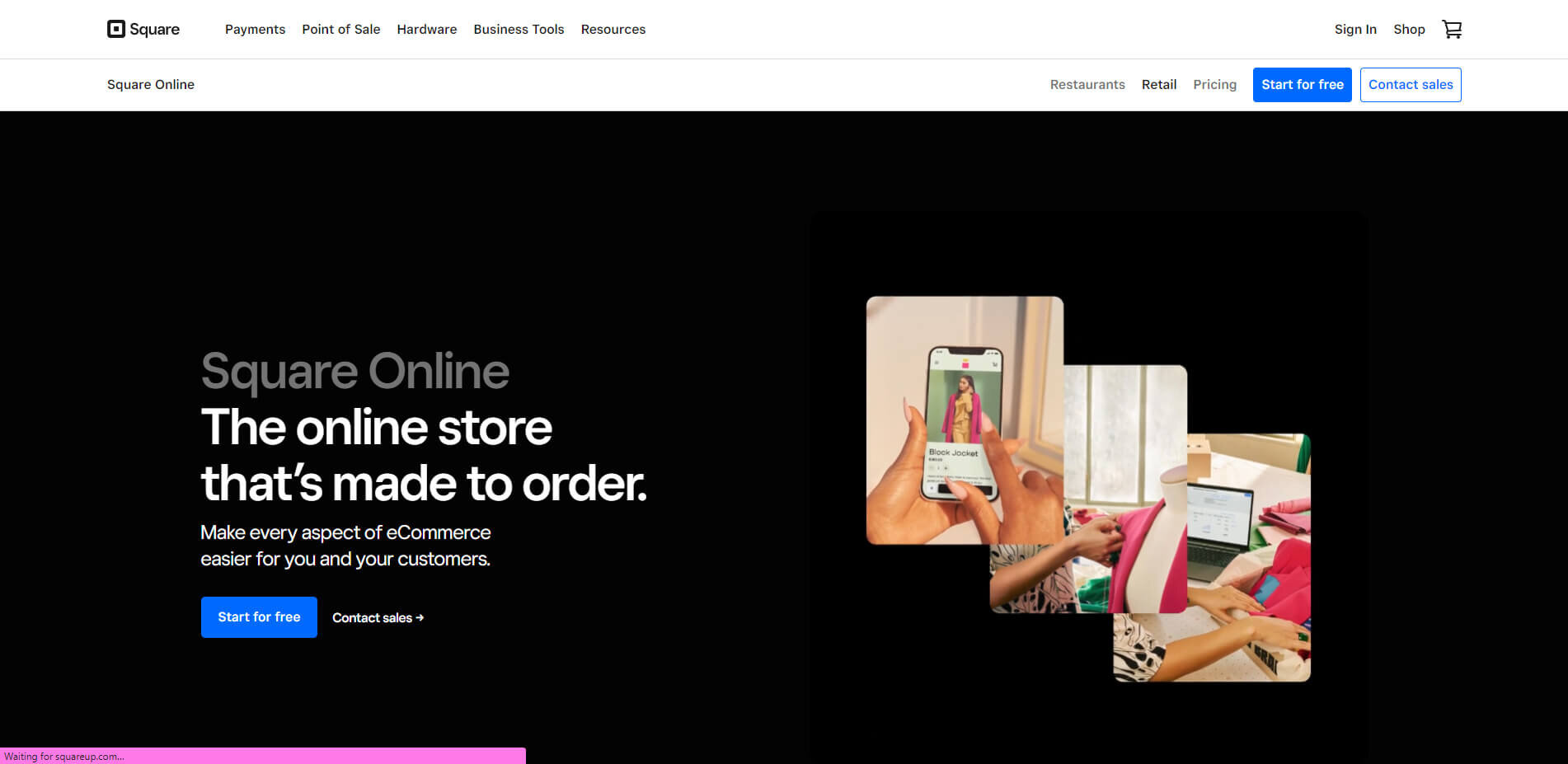
Square Online combines Square’s business management options with Weebly’s website development features. You can get access to a variety of features to create and manage your eCommerce website. Unlike most options in this list, Square Online has a free plan.
You can get a variety of eCommerce store templates, digital marketing, SEO, and store management features with the free plan. The free plan also includes multichannel selling and inventory management. This can be quite useful if you are just starting or experimenting with eCommerce. As you upgrade, Square Online will provide more customisation, marketing, sales, user interface, personalisation, and more features.
This platform’s integration with Square gives you fast payment processing. You can also integrate the point-of-sale POS system from Square to manage online and offline transactions on one platform. With a 14-day trial, the Plus plan offers discounted processing fees and shipping prices.
Pros
- You can start selling with the free plan.
- The free plan comes with ample features.
- Easy to design websites
- Multichannel selling and inventory management
- Integration with Square POS
- Generate QR codes for orders
- Includes search engine optimisation tools
- Websites are easy to optimise for mobile.
Cons
- The free plan features a lot of Square ads.
- No domain registration and SSL certification
- Custom URL is only available with paid plans
- Some payment integrations are only available with paid plans.
- Limited options for customisations
- Limited payment processing options
7. Big Cartel
G2 Rating: 4.2 Stars
Capterra Rating: 4.4 Stars
Forbes Advisor Rating: 4.0 Stars
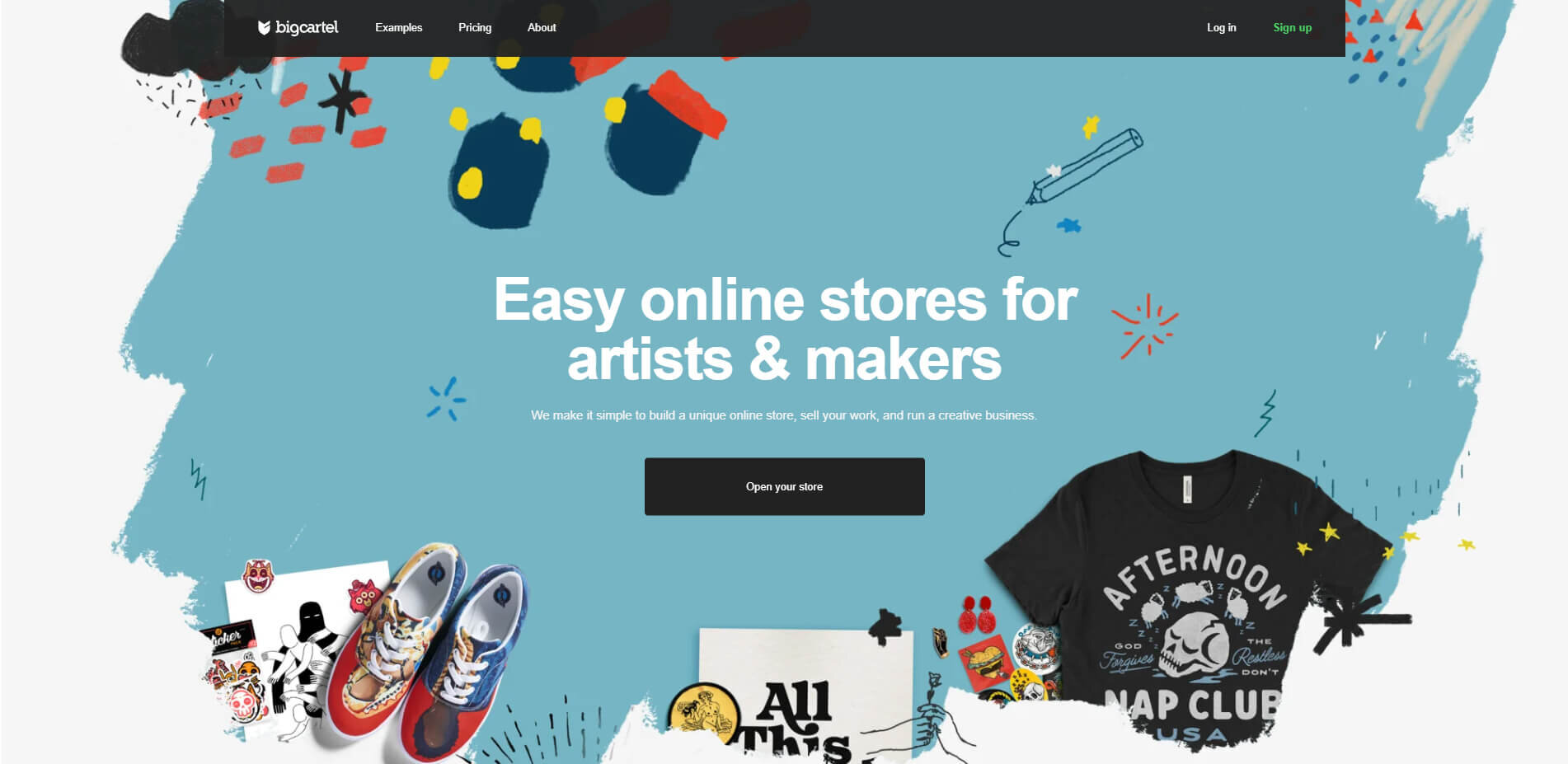
Big Cartel is an eCommerce platform designed to be the best platform for artists, craftsmen, and small business owners. It supports over 84,000 online stores. This is an excellent option if you want to sell a limited number of products and do not want too many complications.
The basic free plan allows business owners to sell up to 5 products, which can be upgraded based on the number of products you want on your eCommerce website. Even with the free plan, you obtain the features you need, including multichannel selling, custom domain names, offline selling, real-time analytics, shipment tracking, and more.
Upgrading to higher plans can unlock other store management and marketing features such as inventory management, bulk edits, promo codes, etc. The overall interface of the platform is user-friendly and intuitive.
You also do not need any technical knowledge to create your eCommerce store. You can use templates to design your store or create a customised one from scratch. Either way, the platform will provide enough guidance to get you through the process.
Pros
- You can start selling up to 5 products, free forever, on certain platforms.
- The free plan comes with essential management tools for multichannel selling.
- Order & Inventory Management
- Shipment tracking
Cons
- Limited templates and customisation features
- Difficult to scale
- Limited sales, marketing, personalisation and management features.
- Lacks advanced eCommerce features
8. Ecwid
G2 Rating: 4.7 Stars
Capterra Rating: 4.6 Stars
Forbes Advisor Rating: 4.6 Stars
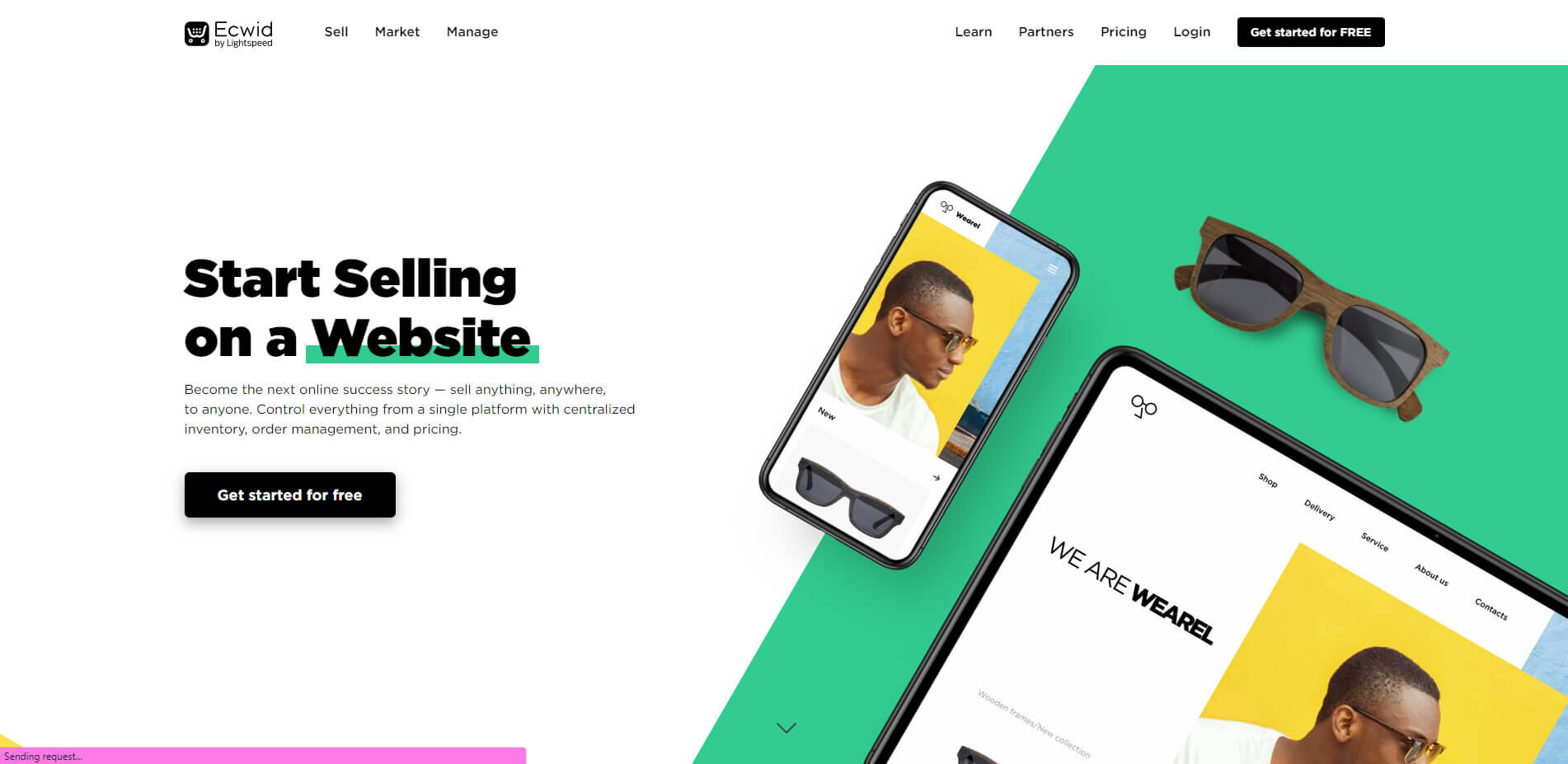
Ecwid is an eCommerce widget and an online store platform. This eCommerce platform allows you to create an online store on your existing website. People can also use the platform to develop an eCommerce website. The platform supports more than 990,000 stores.
You can integrate the Ecwid shopping cart widget to create an online store if you have an existing website. Ecwid works with various website development platforms like WordPress, Weebly, Joomla, Wix, Blogger, Tumblr, and more.
The free plan offers an easy way to sell up to 5 products on the website. It has unlimited bandwidth, instant site builder, free templates, and Apple Pay checkout. The free version also allows you to run ad campaigns on multiple platforms, including Facebook, Google, Pinterest, and Snapchat.
As you upgrade to plans with a monthly fee, Ecwid facilitates multichannel selling, automated marketing campaigns, discounted shipping rates, inventory management, branded shopping apps, SEO tools, product subscriptions and more. Additionally, you can get mobile-responsive websites in all plans.
Pros
- Free plan with ample features.
- Free integration with an existing website.
- Unlimited bandwidth
- GPR compliance
- Custom shopping app
- Mobile responsive online store
- No transaction fees
Cons
- Limited products in the free plan
- The free plan specifically allows you to sell physical items
- Limited design options
- Custom orders are only allowed with paid plans
- The free plan only allows a one-page website
- Limited sales and marketing features
8. Adobe Commerce (Magento)
G2 Rating: 4.0 Stars
Capterra Rating: 4.3 Stars
Forbes Advisor Rating: 3.9 Stars
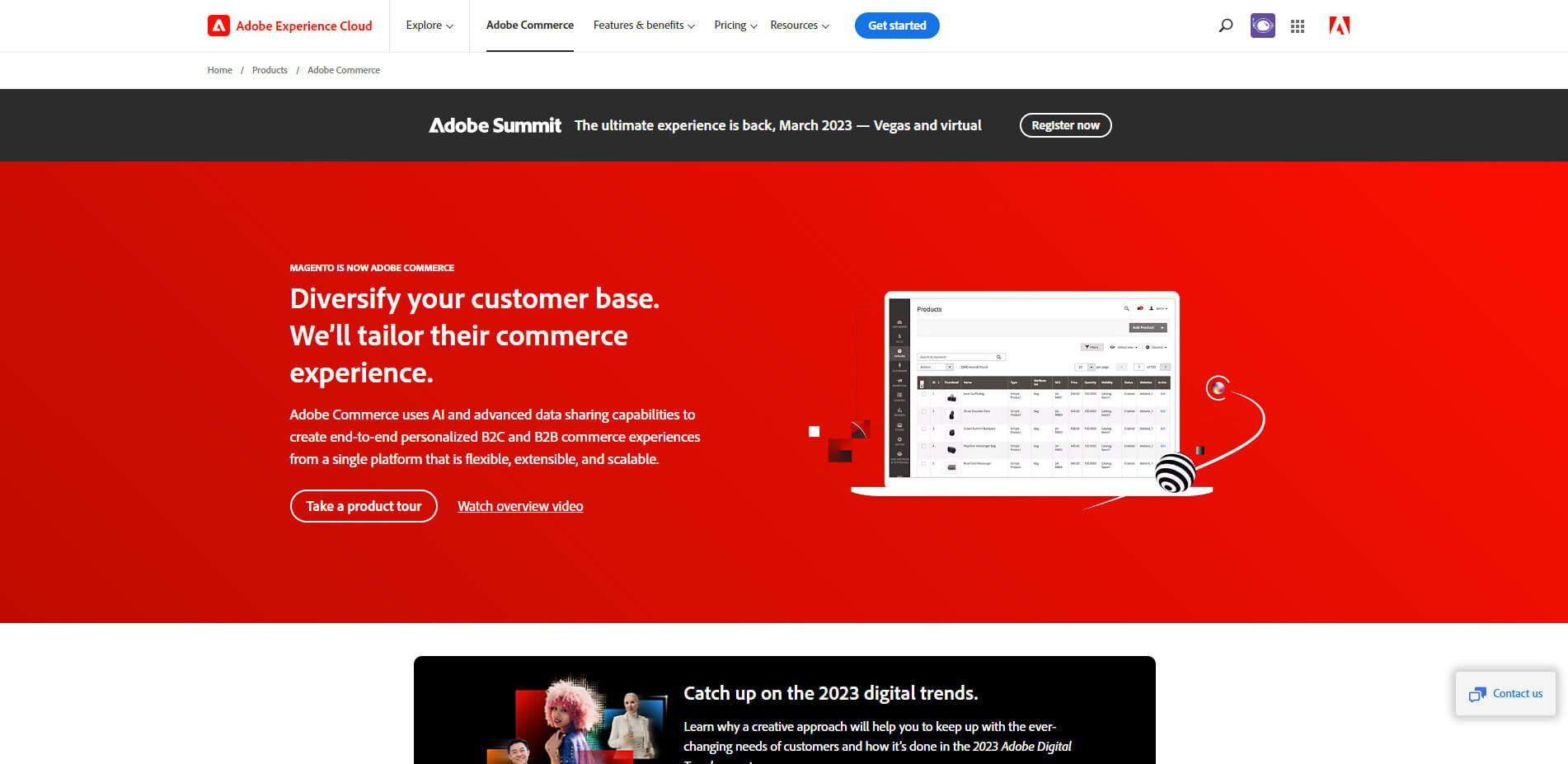
Adobe Commerce (formerly known as Magento) is an eCommerce platform best known for its advanced AI capabilities and integration with other Adobe products. The platform allows you to customise your store to a great extent, including advanced features. The Adobe Sensei-driven AI and automation features can enhance personalisation for users’ online shopping experiences. However, using many of these features requires advanced technical knowledge and tech support.
On the other hand, creating an online store on the website is relatively easy. You can use a drag-and-drop website builder to develop your online store. You can fill it up with as many features as you like. The platform also allows you to customise many of these features as required.
You will also get the necessary backend features to manage the eCommerce business, such as inventory management, payment services, multichannel integration, marketing tools, order management, etc.
Adobe Commerce adds value with data analytics and a money-back guarantee for its services. You can get insights into market trends, consumer behaviour, search patterns, and more. Furthermore, the data also functions as the groundwork for advanced AI and automation functionalities.
Pros
- Abode Sensei-powered AI & automation tools
- Integration with Adobe products.
- Advanced data analytics
- Advanced SEO tools
- Highly customisable
- Scaling flexibility
- Design personalised shopping experiences
- Multichannel selling
Cons
- Requires significant technical expertise and learning.
- Most features require additional payment.
- Requires external hosting
- Extensions are expensive
- Elaborate set-up process
- Pricing is not transparent
9. Shift4Shop
G2 Rating: 3.8 Stars
Capterra Rating: 4.2 Stars
Forbes Advisor Rating: 4.6 Stars

This eCommerce platform has loads of free features (only for the USA). It allows you to build your website and online store from scratch using customisable templates. The free version also includes several tools to manage orders, inventory, shipping, customer service, and marketing, offering great value.
You get unlimited bandwidth and staff accounts. The platform does have a cap on the number of products or sales revenue. But, you are required to maintain specific sales revenue to benefit from the free trial account.
Shift4Shop also facilitates web hosting, domain registration, SSL certification, and mobile responsive shopping. The platform has built-in features for multichannel selling and digital marketing campaigns.
You can run ad campaigns on several platforms and execute abandoned cart recovery campaigns. The users can also send up to 25 thousand email newsletters through the platform. Shift4Shop also has built-in tools for content marketing and SEO.
Pros
- Free plan with abundant features
- Unlimited products, staff accounts, bandwidth
- Free hosting services, domain registration, and SSL certification
- No revenue caps
- In-built fraud protection
- In-built marketing tools
- Easy-to-use website builder
Cons
- Minimum revenue requirements
- Limited apps and extensions
- Limited customisations
- The free plan is only available in the USA
- Sales channel integrations are paid
- An external payment processor is only available with the paid plan
Transform Your Online Business With the Top eCommerce Platforms
Want to receive updates? Sign up to our newsletter
Each time a new blog is posted, you’ll receive a notification, it’s really that simple.
Choosing the best eCommerce platform for your business depends on several factors. You will need to consider the size of your business, types of products, future aspirations, technical knowledge, target customers, marketing needs, and so on.
Though all platforms mentioned in this article offer more or less similar features, each is designed for different types of eCommerce businesses. Instead of going for the highest rates or cheapest platform, you should use the one that best suits your needs and capabilities.



